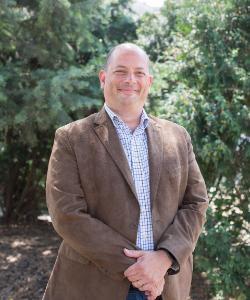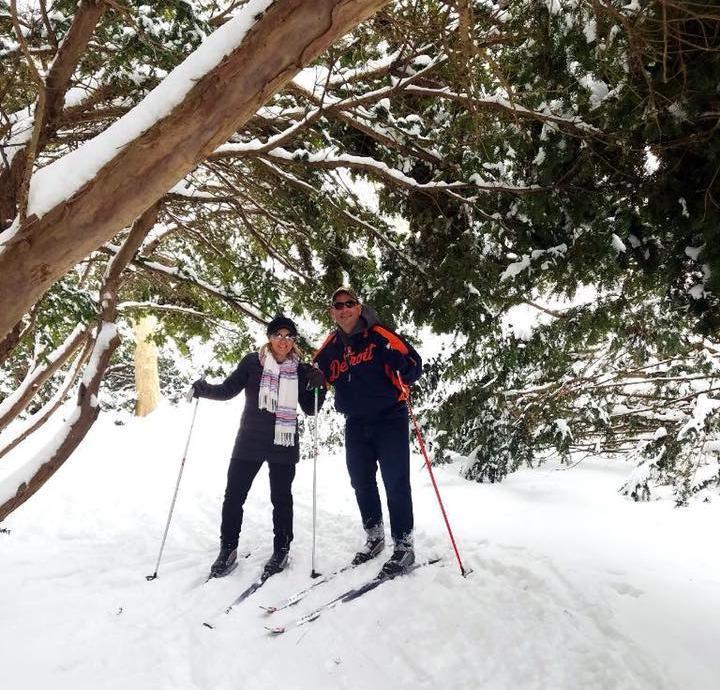February 14, 2018
 For Marriage and Family Therapist Dr. David Van Dyke, who directs Wheaton College’s M.A. in Marriage and Family Therapy, Valentine’s Day is more than a romantic holiday, a day to train future clinicians, or a day to work with clients. It’s also his birthday. “People are always amused to discover that my birthday is on Valentine’s Day,” he says wryly. “I suppose it was amusing to me about 4,000 ‘Dr. Love’ jokes and 40 red heart-shaped cakes ago.”
For Marriage and Family Therapist Dr. David Van Dyke, who directs Wheaton College’s M.A. in Marriage and Family Therapy, Valentine’s Day is more than a romantic holiday, a day to train future clinicians, or a day to work with clients. It’s also his birthday. “People are always amused to discover that my birthday is on Valentine’s Day,” he says wryly. “I suppose it was amusing to me about 4,000 ‘Dr. Love’ jokes and 40 red heart-shaped cakes ago.”
“Jokes aside, I am joyful and fortunate in my calling to teach, write, and work on a day-to-day basis with relationships and to help others grow in understanding and sustaining them,” he says. In this Wheaton Experts blog post, Dr. Van Dyke shares a model he developed to help couples strengthen their relationships.
As a marriage and family therapist, I often counsel people who have the expectation that “If my partner would change, my life would be fine.” While the disciplines of clinical psychology and counseling focus on helping individuals thrive, the field of Marriage and Family Therapy addresses relationships by focusing on how relational systems affect the individual. I focus on systems thinking. That means that when I work with a couple, I don’t think of “him” or “her” separately. Instead, the unit of analysis is the relationship. If the relational structure is good and the system is healthy, then there is a greater likelihood that an individual partner’s functioning will be healthy, too.
My wife Tara and I love to engage in active adventures together. For our anniversaries, our gifts or celebrations tend to be activities like kayaking on the Milwaukee or Chicago rivers, or, more recently, cross-country skiing.
With cross-country skiing, one thing you learn pretty quickly is that the going gets much easier when someone has already pioneered a track ahead of you.
Over the years of research, work with clients, teaching, and of course through trial and error in my own marriage, I have identified five elements of a “TRACK” —Trust, Respect, Affection, Companionship, and Knowing each other—that are helpful in building a strong relational structure.
Trust
Trust is the biggest and most foundational component to any thriving relationship. Trust means I can feel safe with you and you feel safe with me. For us as Christians, trust is first grounded in our trust and relationship with Christ. If there is a safe, secure attachment and connection with God, then we are freed up to respond in a secure and trusting way to our partner.
Respect
Think of the TV shows “The Bachelor” and “The Bachelorette:” they demonstrate a trend in our society of moving away from respect for a person and towards objectifying that person or objectifying a relationship—the person or relationship then just becomes an object that completes me, gratifies me, fulfills my lack, or gives me pleasure.
We can readily see some of the ways that objectification affects our children, and our society: through pornography, body image issues, technology as a means to project an identity, et cetera. But respect is choosing to see and value the other person in their complete personhood, not simply as an object for or an extension of yourself. As Christians, we should view our partners in wholeness, as created in God’s very image and loved by Him unconditionally.
Affection
On Valentine’s Day, and every other day, a lot of advertising says “if you perform/buy/give X, then you will receive Y.” That is not real affection. Affection is pretty simple and straightforward: do the kind and caring thing for the other person simply for the sake of doing it. Don’t show affection for selfish gain. Don’t do it with a secondary goal in mind. Ideally, we respond to others as an act of worship to our God. This is freeing.
Affection is the means and the end, a thoughtfulness with no goal other than just to care, expectations and goals aside. And it’s in doing the small things, like washing the dishes, or shoveling the sidewalk so your spouse can leave for work, or making them lunch or their favorite snack when they don’t anticipate it. For each couple I work with, those things are different, but they communicate, “I’m thinking about you.” That intentional thoughtfulness is meaningful affection.
Companionship

Dr. Van Dyke and his wife Tara, a certified labor doula, enjoy skiing together as a way to connect and build companionship.
I think of companionship in two ways. One is, what do you like to do and share together? For Tara and me, little frequent activities like kayaking and skiing build our sense of companionship. For other couples it may be cooking together, reading together, seeing Shakespeare in the Park, or sharing a common hobby or interest. Whatever it is, it’s something that you can share and enjoy together.
But the second component of companionship is even more integral, and this is to conceive of the Big Picture of your relationship. This theme emerges in the research from scholars like John Gottman and Sue Johnson. Relationships are richer when you have a sense that you are in it for something bigger than just yourself, and beyond meeting one another’s needs. As Christians, the “something bigger” is that marriage is supposed to be a picture of Christ’s loving relationship with the church. In this sense, marriage isn’t “the thing,” it’s a thing that helps point us to “the thing.” That can help those of us in the church to value marriage, while avoiding idealizing and idolizing marriage as an end in and of itself.
Knowing Each Other
Knowing each other, and continuing to know each other, is tough, as it involves a continuous engagement in curiosity about the other and vulnerability towards the other. Jack and Judy Balswick identify the need for this balance—for a mutual back-and-forth of knowing your spouse and allowing yourself to be known. We are usually better at one than the other, but we need to engage in both to enrich the relationship.
Curiosity helps you continue to grow and get to know one another in a deep and meaningful way, beyond simply asking “What did you do today?” And vulnerability responds by sharing the uncomfortable, the unknown, and the unsettled. That’s probably the biggest fight that Tara and I had early in our marriage. She shared a problem with me, and I responded with all of my training, my wonderful skill set, and offered the perfect therapeutic response. She called me on it: “I don’t need a therapist—I need David.” I responded with panic initially: Uh-oh. David’s not here right now. Can you leave a message? I had to learn how to be relationally present, and vulnerable. I am still learning and working on this.
We may think we have arrived at knowing one another because of the length of time we have been together, but we must instead assume a posture that says, “you and I are constantly changing, and I must always remain active in discovering you and disclosing myself.”
The M.A. program focuses on developing professional therapists who utilize their Christian faith to help create healthy relationships. Discover more information about this program by clicking the link below.